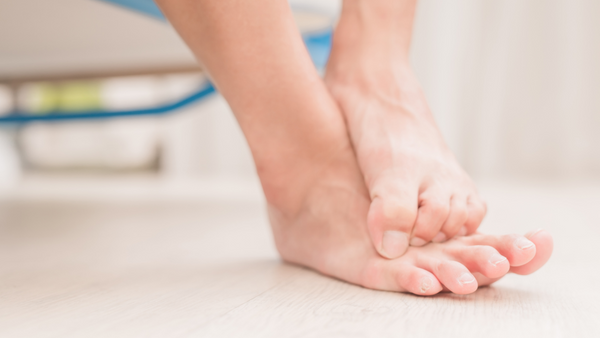Athlete's foot is extremely unpleasant: it causes itching, redness, blisters and scales. Athlete's foot mainly affects the soles of the feet, but often also affects the spaces between the toes, where the skin can easily tear. The fungus can also spread to the toenails and cause nail fungus, which is difficult to treat.
Athlete's foot is a fungal infection of the skin. It is caused by filamentous fungi and dermatophytes that attack the skin. The fungi feed on the horny substance of the skin.
The risk of infection is particularly high in public places where people walk barefoot, such as swimming pools and saunas. Sweating in shoes also promotes the development of athlete's foot, as fungi love it warm and moist.
People with immune deficiencies and diabetes have an increased risk of athlete's foot.
Athlete's foot is very contagious and can spread to other areas of the skin, such as the hands and the intimate area. That's why it's extremely important to maintain good hygiene when you have athlete's foot and to treat it as quickly as possible.
Athlete's foot does not go away on its own and must be treated with antifungal agents, so-called antimycotics. Athlete's foot is usually treated with creams or sprays that contain antimycotic agents.
In the case of large-scale infestation or if the fungus cannot be treated externally, tablets containing antimycotic active ingredients are also used. However, these often have unpleasant side effects such as nausea, itching and loss of appetite.
Micronutrients can support the treatment of athlete's foot.

Vitamin C
Vitamin C plays an important role in the immune system. [1] Vitamin C also promotes the formation of collagen. Collagen is the most common protein in connective tissue, which also includes the skin. If there is an insufficient supply of vitamin C, wound healing is impaired, making it easier for fungi to attack. That's why you should make sure you have enough vitamin C if you have athlete's foot.
zinc
Zinc has many functions in the immune system. At the same time, it is very important for the skin. It promotes the regeneration of skin cells and thus stimulates wound healing. [2] Fungi damage the skin, which makes it easier for them to multiply. [3] That is why a good supply of zinc is particularly important for athlete's foot.
Vitamin D
Vitamin D is very important for the immune system. It helps us fight fungi. A vitamin D deficiency makes us more susceptible to all kinds of infections.
In addition, vitamin D is needed for the formation and maturation of skin cells. [4] A good supply of vitamin D therefore makes the skin resistant to fungi.
β-Glucans
β-glucans are dietary fiber. The cell walls of fungi consist of β-glucans. An increased intake of β-glucans sensitizes the immune system to fungi. This makes it easier to fight fungi in the event of a fungal infection. [5]
Medicinal mushrooms such as reishi , cordyceps and almond mushroom are very rich in β-glucans. It is therefore obvious that they could have a supportive effect on athlete's foot.
Grapefruit seed extract
Grapefruit seed extract attacks the cell walls of bacteria and fungi, thereby inhibiting their growth. [6] Unfortunately, there is little data on humans, but due to its antifungal effect, grapefruit seed extract is very promising for athlete's foot.
Conclusion: The immune system needs nutrients to fight athlete's foot
Our immune system is the most effective weapon against athlete's foot and other infections, so it makes sense to avoid a deficiency in nutrients that the immune system needs.
A good supply of vitamin C, zinc and vitamin D is very important for immune function.
[1] https://pubmed.ncbi.nlm.nih.gov/29099763/
[2] https://www.ncbi.nlm.nih.gov/pmc/articles/PMC5793244/
[3] https://onlinelibrary.wiley.com/doi/abs/10.1111/j.1365-4362.1980.tb01997.x
[4] https://pubmed.ncbi.nlm.nih.gov/23174792/
[5] https://pubmed.ncbi.nlm.nih.gov/20186110/
[6] https://academic.oup.com/jbcr/article-abstract/24/suppl_2/S139/4734379?redirectedFrom=fulltext

















